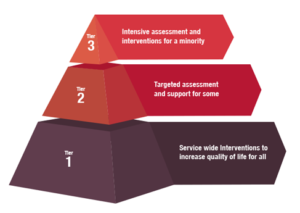Positive Behaviour Support (PBS) is a person-centred approach aimed at improving the quality of life for people with high support needs. PBS is part of everyone’s job, so alongside direct care staff and specialist staff who have qualifications in PBS, team leaders and service managers should also have training in PBS. Staff in these roles have the potential to lead, support and influence the implementation of Positive Behaviour Support in their services and subsequently across the organisation.
So, what should PBS training include for Team Leaders and Service Managers? Training should be practical, avoiding the use of technical language or jargon as far as possible. These staff need to be able to support their teams in understanding and implementing key practices at what we call Tier 1 PBS.
The Tier 1 practices in PBS centre around the Capable Environments Framework developed by the Tizard Centre. These include key areas of life and support, which if we are able to get right, will lead to high quality support services and a good quality of life for people supported. They are also likely to lead to reductions in behaviours of concern and potentially reduce the use of restrictive practices.
Training should ensure staff have a good understanding in the 10 areas of the Capable Environments Framework, as well as practical ways of implementing PBS strategies. The key points below outline some of the specific topics staff should understand and be able to communicate to their teams, in addition to the Capable Environments Framework.
Person-Centered Approach
There should be an emphasis on seeing behaviours from the perspective of the individual, ensuring that their preferences, history and circumstances are central to any support plan.
Understanding Behaviours of Concern
Staff should understand and be able to discuss with their teams the key vulnerabilities that make someone more likely to present with behaviours of concern. They should also understand and be able to discuss the underlying reasons for a behaviour of concern or what we call the ‘function’ of a behaviour. This information helps all staff to avoid taking any behaviour directed towards them personally and increases their ability to put the right supports in place.
Understanding Proactive and Reactive Strategies
A common misunderstanding about behaviours of concern is the idea that a response to the behaviour when it occurs will reduce the occurrence of that behaviour. These responses at this point are called Reactive Strategies; they are an important part of managing any risks associated with a behaviour but will not reduce the behaviour’s occurrence over time.
What we know from the scientific understanding of behaviour is that any response which reduces the behaviour or its impact (applied at the time of the behaviour) is likely to increase its occurrence in the future. That’s why a PBS approach is primarily centered around what we call proactive strategies. These are aimed at meeting the persons needs and helping them build new skills, developing as much independence as possible.
Ethical Considerations
Staff need to understand that PBS is based on the ethical principles of respect, dignity, and human rights. All strategies should be designed and implemented with the individual’s best interests in mind if they do not have the capacity to consent and with their consent if they do.
Collaboration and Co-production
Senior support workers, team leaders and service managers are in a prime position to facilitate a collaborative approach within the support team and a co-production approach (where possible) with the person supported and their family where appropriate. Effective communication and coordination among staff, families and other stakeholders are vital, so this should be included in training for this group.
Leadership Skills
Training should involve discussions around leadership skills that inspire and motivate staff. Effective leaders can foster a positive workplace culture that supports the implementation of PBS. Equipping leaders with the tools to think through and resolve issues within the team is also useful. Quality support is a challenge for a team who are struggling to work together. See further blog on this here:
https://redstonepbs.co.uk/understanding-barriers-to-effective-teamwork-in-pbs/
By focusing on these essentials, PBS training for team leaders and service managers can lead to the creation of supportive, effective and ethically sound environments that enhance the quality of life for individuals receiving support. PBS is everyone’s responsibility and making sure everyone understands their role means PBS will become well established in the service or organisation.
Get in touch to find out more about our training offers by calling 0161 327 4511 or email info@redstonepbs.co.uk.
Author
Kate Strutt – Director of Redstone PBS and Clinical Psychologist.
Kate has over 20 years’ experience of working with adults and children with intellectual disabilities and those who are autistic, both within statutory services and the independent sector. Kate is registered with the Health and Care Professions Council. Bsc Psychology, D.Clin Psyc, MSc Applied Behaviour Analysis.










